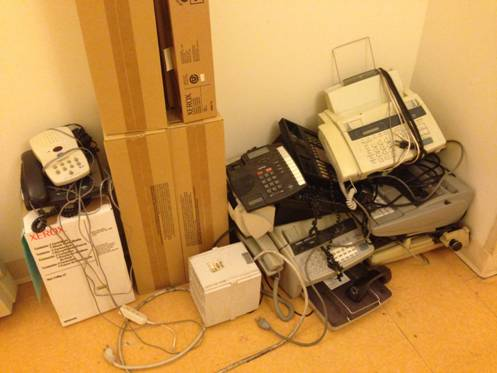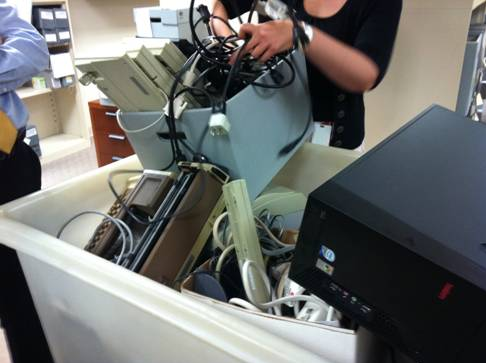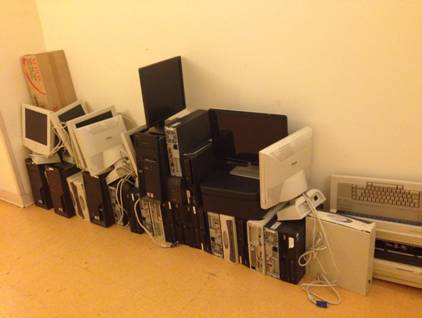By Lauren
Paustian, Associate Librarian for
Technical Services, Leo Baeck Institute
The
Center for Jewish History and its partner institutions strive to preserve Jewish
history and culture for future generations.
As collection stewards and community builders, many staff members of the
Center for Jewish History and its partner organizations also make an effort to
promote environmental responsibility.
Last year, a number of employees from the Center for Jewish History and
its partners formed a sustainability committee.
The committee intends to advocate
for “green” activities and projects to take place at the Center for Jewish
History.
One
successful initiative organized by the sustainability committee was an
electronic waste recycling drive for staff.
The drive took place during the fall of 2015. In honor of Earth Day on April 22, here is
some more information about this initiative.
Electronic
waste (or e-waste) consists of consumer electronic equipment (personal
computers, media players, TV monitors, and/or audio visual equipment) that is obsolete or no longer needed. Disposing of electronic waste with regular
trash is potentially harmful to people and bad for the environment. Electronics often contains heavy metals (such
as lead, mercury, and cadmium) -if discarded in landfills, the heavy metals could
eventually leech into the surrounding soil and end up in water sources.. Disposal of e-waste with regular garbage
collection by local sanitation departments is actually illegal
in New York state.
Although
the Center for Jewish History is only fifteen years old, a large amount of unused
electronic equipment had built up “behind the scenes” during that time. With increasing improvements in technology, many
old computers, scanners, and printers had been replaced. The obsolete electronics
were
usually placed
in out-of-the-way locations such as closets, under desks, and on shelves to be
dealt with later. The e-waste was taking
up valuable space and in some cases creating unnecessary clutter.

Obsolete electronic products
that were no longer needed at the Center for Jewish History or its partners.Photo by Claire Kenny, Center for
Jewish History
The
Center for Jewish History’s sustainability committee coordinated a collection
of e-waste in the building. Over one
hundred items were collected—everything from desktop computers, to keyboards,
to fax machines, to electronic pencil sharpeners. One of the partner organizations even found
several typewriters and a teletype machine.
The e-waste was first evaluated to see if any of it could be shared
among other departments or offices. The
computer hard drives also had to be wiped clean by the hard-working information
technology staff.

Leo Baeck Institute staff
collecting electronic waste from their office. Photo by Tracey Felder, Leo Baeck Institute
Once
all the e-waste in the building was collected and analyzed, the next step was
to determine how to responsibly dispose of it.
Several organizations in New York City sponsor e-waste recycling
initiatives and drop-off events. Many of
these organizations do not accept bulk quantities of electronics from offices
and other businesses. The sustainability
committee ended up working with the Lower East Side Ecology Center to pick-up the e-waste from the Center.

An assortment of old desktop
computer monitors and hard drives waiting to be recycled. Photo by Claire Kenny, Center
for Jewish History
The
Sustainability subcommittee hopes to hold more electronic waste drives at the
Center for Jewish History in the future, perhaps taking place every two
years. At future events staff or visitors
may also be able to deposit their
personal electronic waste.
